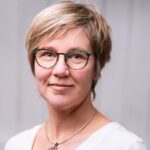Reflections from an Ubuntu Journey with Sicelo Mbatha
This past week, we were grateful welcoming South African wilderness guide Sicelo Mbatha to the Bert Hellinger Instituut Nederland in Drenthe. Last autumn Sicelo took us, facilitators of the Bert Hellinger Institute, on a wilderness trail in Imfolozi National Park. Walking ancient lands there, crossing rivers and experiencing nature was a deep and transformative experience. And last Sunday the team of facilitators, our partners and kids could meet and greet Sicelo and we now walked the fields, forests, and ancestral layers of the land surrounding our training centre in Rolde together. On Monday, my colleagues Marion Latour and Jochen Beyer facilitated a profound session on inter-being with horses with Sicelo on their farm in Gieten. The horses invited us into a different kind of presence, one rooted in relational intelligence and quiet trust.
The final two days: a deep immersion into Ubuntu & the Web of Life, I had the joy of co-facilitating with Sicelo.
Ubuntu: not a concept, but a way of being
Over the course of these two days, rituals, storytelling, body-based practices, walking and begin in nature, silence and sharing, opened us to a deeper sensing of what it means to belong and to live Ubuntu. Sicelo’s presence brought the Zulu greeting Sawubona — “we see you” alive in many moments of connection. e explored how Ubuntu — “I am because we are” — lives in our systems, our daily choices, and in the land itself. And how Ubuntu and systemic work are intertwined.
Finding our inner Ubuntu
We practiced in opening our senses, walked in silence, had a forest immersion being accompanied by a hawk. Learned, being surrounded by hunebedden (ancient megalithic tombs) how ancestors are an everyday reality in Zulu culture. Expanded our awareness about energy of others, own boundaries and moving with care and presence. Essential skills in the African wilderness and in our daily life here: being a foundation of respectful, regenerative relationships — between people ánd with the more-than-human world. We gathered in the Balloërkuil, a natural amphitheatre, where Sicelo shared stories of Indaba, a traditional Zulu approach to justice based on communal listening and restoration. Through all this we were invited to find our inner Ubuntu: the deep sense of connection that we carry within us: with our bodies, others, nature, and life itself.
Ancestors of the land
In th the early morning we gathered at the Balloërveld to have a silent early morning walk. Slowly turning in a circle there and taking in the vast horizon, became a living morning prayer of acknowledgment to the land and all who came before us. Constellations in small groups, helped us to further explore everyone’s relationship to our place of birth, the places where we live now and places of our ancestors.
Every time we practised to stay away from fixing. To listen. To be. To hold the space for what wants to show up. For grief, for joy, for the unspoken. Every time entering the field without expectation — as we discovered time and again: expectation ends relationship. And after the constellations, we danced. We danced the soil. Just as Archbishop Desmond Tutu would pause the Truth and Reconciliation hearings to sing and dance when emotions ran high, we too made space for the body to release, integrate, and return home. These days deepened our understanding of ancestors. Ancestors are not only our family lineage. The land, too, holds ancestors — all who lived, breathed, and shaped it before us. People, animals, plants. Their presence is part of the web of life we walk through every day.
Systemic work as daily practice
We experienced how the essence of systemic work not only illuminates in constellations but also in everyday life: in how we greet, speak, move, relate, and simply are. And how small daily rituals can help us to remain connected with ourselves, with one another, and with the earth. Ubuntu reminded us that healing often happens before anything breaks, when we dare to stay in relationship. These two days reminded us of a deep sense of belonging.
We see you. We are here. We are, because others are. We are nature.
What kind of ancestor do you want to be?
On our final afternoon, Sicelo shared his life story and left us with one powerful, quiet question: What kind of ancestor do I want to be? Not as pressure, but as possibility.
I feel deeply grateful for what could arise during these days — in the holding of the Bert Hellinger Instituut Nederland , in nature, in ritual, and in shared humanity.
Sicelo’s Yearly Summer Visit to Europe is facilitated by Spiritual Ecology Netherlands
Want to learn more about systemic work and constellations?
Knowledge
Books, blogs and videos: our trainers are happy to share their knowledge, experience and insights on systemic work.
About BHI
The Bert Hellinger Institute is your training, knowledge and research centre for systemic work. Find out more about our team, locations and history.
FAQs
Are you new here or is something not clear? Check out the FAQs about systemic work in general or the Bert Hellinger Institute.
Subscribe to our newsletter
We send the latest blogs, vlogs and our course offerings monthly through our newsletter. Stay informed and subscribe.
SubscribeAbout the Bert Hellinger Institute
People are constantly evolving. With each other, without each other. In families, in teams, in organizations. Systemic thinking makes us aware of the “why” of our being and doing. Organizational and family constellations create room for movement. The BHI provides courses, workshops and training programs in the field of systemic work, constellations, leadership and coaching. This is how we contribute to the development of people, organizations and society.

